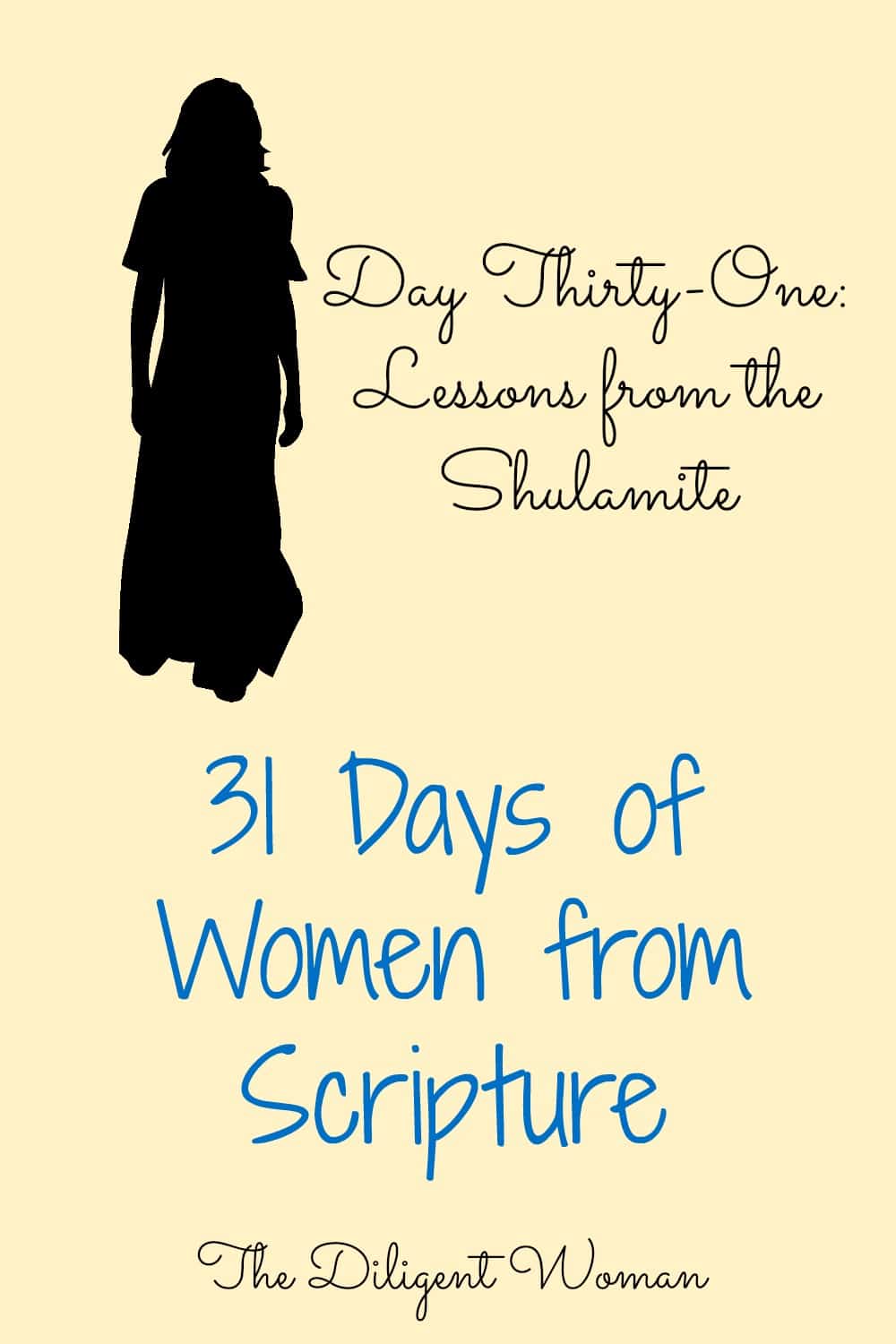Lessons from the Shulamite
31 Days of Women from Scripture
Day Thirty-One
Lessons from the Shulamite
For our last lesson in this series we are going to look at the Shulamite woman in Song of Solomon. She is the voice of the book. All of the conversations are either ones she is participating in or she is remembering from another time.
Before we look at her, I would like to explain a few things up front. My understanding of the book of Song of Solomon is that it is a love triangle between and King (Solomon), a young maiden (the Shulamite) and the maiden’s love interest back home (her “Beloved” shepherd). I take this point of few for several reasons:
- Ephesians 5:17 says, “So then do not be foolish, but understand what the will of the Lord is.” – God gave us this book, He tells me to understand His will, therefore I should be able to understand Song of Solomon.
- 2 Timothy 3:16-17 says, “All Scripture is inspired by God and profitable for teaching, for reproof, for correction, for training in righteousness; so that the man of God may be adequate, equipped for every good work.” – God’s word is a stand alone work of literature. There is no sequel (Jude 3). Song of Solomon is God’s word. It is truth (Jn. 17:17). I can trust that Song of Solomon is from God, it is for me, and it is to be taught to others.
- 2 Peter 1:20-21 says, “But know this first of all, that no prophecy of Scripture is a matter of one’s own interpretation, for no prophecy was ever made by an act of human will, but men moved by the Holy Spirit spoke from God.” This reiterates the first two points, but it also leads me to not put a lot of faith in commentaries written by men. It also causes me to be very careful – that I speak what the scriptures say and go no further.
- Scripture must agree. If Scripture is truth and that truth is not to be interpreted differently by each person, then the writers of each book in the Bible MUST be in agreement with one another.
This is not a lesson about the book, so I will not go through how I directly apply all of that to a study verse by verse. I will put links at the end of this lesson to places where I do that. However, my understanding of the Shulamite woman is based upon her being a maiden and having to make a choice, which is often not the view taken of the story. Now that is out of the way – let’s look at this excellent example of a godly young woman!
Her name is not given. She refers to herself in Song of Solomon 6:13 as “the Shulammite”. She is a country girl who has worked in the vineyards (S of S 1:6) and loves a young man who is a shepherd (S of S 1:7; S of S 6:2). She has been brought to the tents of Solomon (S of S 1:12; 3:7) to be prepared as a potential wife, similar to Esther (Esther 2:8-12).
The Shulamite has a healthy view of her own image. In Song of Solomon 1:6, she tells the group of women called the “daughters of Jerusalem” not to stare at her because her skin is dark. She does not apologize for not having fair skin, she simply explains that she has worked hard in the vineyards and taking care of her skin has not been a priority. Despite being in the middle of Solomon and his women, she holds her head up with confidence, but not with arrogance. In Song of Solomon 2:1, she sees herself as being different from those around her, but she doesn’t feel badly about the difference. She describes herself as a flower, but a simple country flower – a rose or lily of the valley. She owns her own beauty without being puffed up about it.
The Shulamite shows self-control. While being told how beautiful she is by Solomon and the women around him (S of S 1:8; 4:1-5; 6:4-9; 7:1-9) she repeatedly asks that they not push her or rush her to make her choice. “I charge you, O daughters of Jerusalem, By the gazelles or by the does of the field, Do not stir up nor awaken love until it pleases.” is said in Song of Solomon 2:7, 3:5, 5:8 and again in 8:4. Her beloved describes her as a “rock garden locked, a spring sealed up” in 4:12. She says of herself that she was “a wall, and my breasts were like towers” in Song of Solomon 8:10. She is answering a riddle that was asked about whether or not a little sister was a wall or a door, what should be done for her (S of S 8:8-9). A woman who is a door needs great “planks of cedar” to block up the door way to her purity. The Shulamite however, she was a WALL – she was a fortress of her own making against the advances on her purity. She protected her purity by preparation and awareness, aka “towers”. Even though she had moments where she was embraced by her Beloved (S of S 2:3-6) and longed to be able to kiss him (S of S 8:1-3) she did not give in to her desires.
The Shulamite had a proper respect for the sexual relationship. As we noted, she showed self-control. But throughout the book, there is no question that she anticipates the physical relationship with joy. She is distressed when she dreams of her Beloved wanting her and she misses the opportunity because of her indecisiveness (S of S 5:2-7). Once she makes her choice, she wants to head home with him, but stopping along the way to enjoy the fruits of the land and each other, which she has “saved up for” him (S of S 7:10-13). When finally she and her Beloved are married, he asks to be called into the “gardens” and she responds for him to find her quickly (S of S 8:13-14)! This young woman knows she is made to please him, (S of S 4:16), but knows she does not yet have the right to do so (S of S 1:16; 8:1-5a; compare to Heb. 13:4).
The Shulamite knew what love looked like. There are several speeches in the book. Solomon twice tries to tell her just how beautiful he thinks she is, that she is perfect and unique (S of S 4:1-5; 6:4-10). Why, she’s even better than all sixty of his wives and eighty of his concubines (S of S 6:8-9)! Solomon compares her to cities, war horses, ornate jewelry, flocks of sheep, and other food and animals. But the words that touch her heart, are the simple words of her beloved Shepherd. The Beloved speaks of her natural beauty (S of S 4:7, 9-10). He speaks of her words as being beneficial and a blessing (S of S 4:11; compare to Prov. 16:24). He compliments her keeping of her purity while also acknowledging that she will be prepared for marriage (S of S 4:12-15). She is confident in his trustworthiness (S of S 2:16; 6:2-3). These two speak of each other in terms of good, moral character. Solomon and his women only speak in worldly, sexual terms. The Shulamite knew which was better for her.
One of the biggest lessons I believe can be taken away from Song of Solomon is that love is a CHOICE! The world says that love is something that is fallen into. We are told that we cannot control who we love. This woman emphatically shows us differently! She had a choice between a King with his riches, good food, fancy, tents, and cities or a Shepherd boy who would give her a home among the trees (S of S 1:17). She already loved the shepherd and knew he was getting impatient to marry her (S of S 2:8-14). But when she is brought to King Solomon, she considers her options. Her dreams show that she knew what she wanted (S of S 3:1-4) but she almost took too long choosing (S of S 5:2-7). The first time she tells the women not to rush her (S of S 3:5) but the second time she begs them to tell her beloved that she misses him (S of S 5:8). She almost missed it in the dazzle of Solomon’s richness. But in the end, she chooses her hard-working, constant, only has eyes for her shepherd. Proverbs 5:15-19 is one place in particular where Solomon teaches the wisdom of a man and a woman being married in their youth, but still longing for and being captivated by one another in their later years. The Shulamite woman chose the wise path to love.
This young woman shows other young people how intimacy can looked forward with delight and anticipation, but still SAVED for the marriage bed. She shows how her healthy self-image created a protection around her. No one had to protect her purity, she was in command of it herself! Having desires is natural, but so is controlling them! Even when she is free to express those desires in marriage, they STILL must be under control so that they are not expressed towards anyone other than he spouse. This young woman shows that it is wise to choose a hard-working, loving, committed man. In the end, she went away to a world of PEACE and left the chaos of Solomon’s court behind her.
Enjoy!



Thank you! I really enjoyed this!
This is deep!